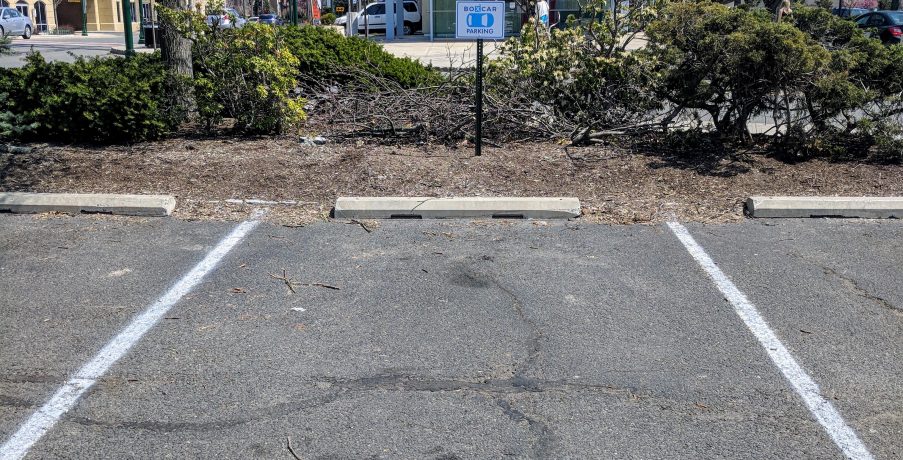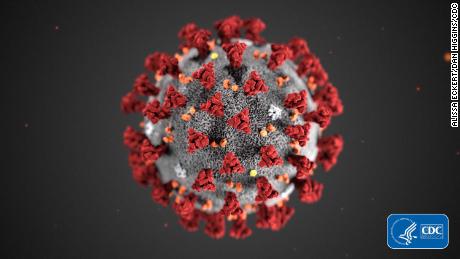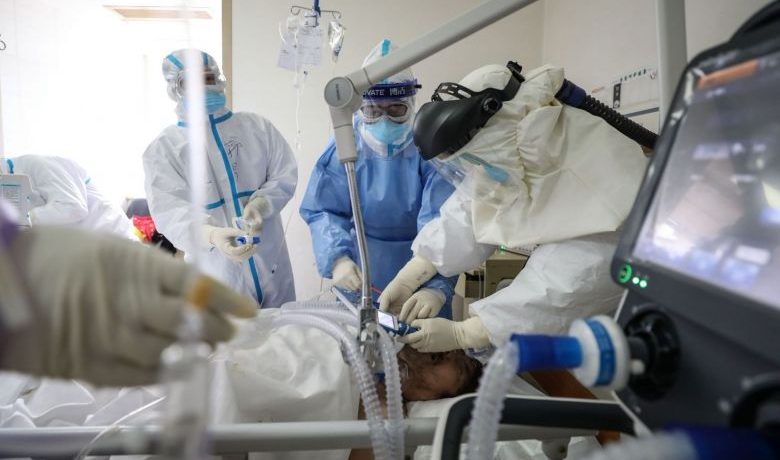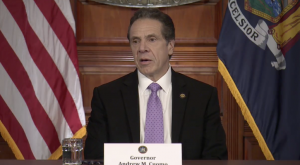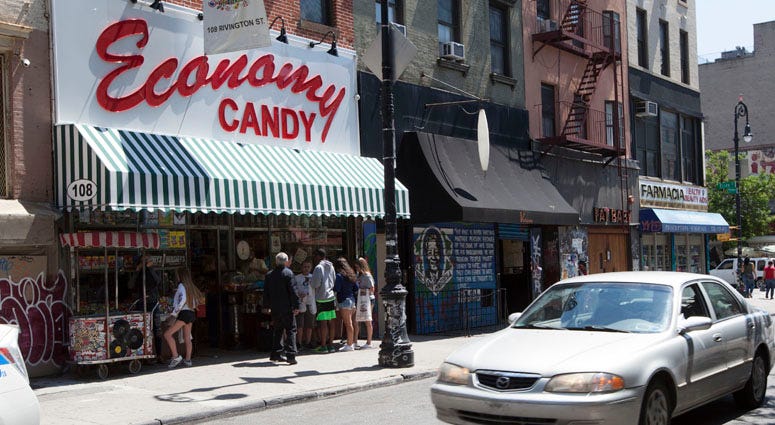
Neil A. Carousso produces NewsNation original “Kurt’s Country” – a celebration of country music and a slice of Americana with host Kurt Bardella.
-
NJ Woman Starts Effort To Help Medical Professionals At Frontlines Of COVID-19 Crisis
Posted by: Neil A. CaroussoPost Views: 1,145By Neil A. Carousso
NEW JERSEY (WCBS 880) – A community is coming together in Chatham and Madison, NJ to support the doctors and nurses on the frontlines of the coronavirus pandemic.
Chatham resident Liz Bernich saw a Facebook post from her friend last week about a group in Huntington, Long Island that delivered food to their local hospital for the staff who are testing and treating patients for COVID-19. She shared the post with the Chatham Community Forum on Facebook to see if there was interest do the same at Morristown Medical Center. She became inundated with messages from people who were interested in supporting the initiative.
“My phone was just lighting up,” Bernich, who is a principal at The Caldwell Partners, told WCBS producer Neil A. Carousso via Skype from her home where she is working while non-essential businesses are shutdown.
Soon after gathering interest from her community, residents in Madison, where her husband works as a high school teacher, contacted her asking if they can volunteer. She launched the Front Line Appreciation Group or FLAG on Facebook to mobilize volunteers and encourage them and first responders to share their experiences with the organically growing group of community members.
Bernich contacted a local restaurant on Friday morning to order take-out for that night. The restaurant was thrilled to have business since Gov. Phil Murphy ordered all restaurants statewide be closed on Monday, except take-out and delivery services, to prevent the spread of coronavirus.
Friends connected her with nurses in the emergency room at Morristown Medical Center.
“We found out very quickly that a lot of the folks in the ICU units were being basically locked down in their units during their shifts, so they’re unable to access the cafeteria,” Bernich said.
Nurses and doctors working 12-hour shifts during a global pandemic were ordered not to leave their stations to prevent contamination of other hospital areas, patients and employees.
“You can tell they need the energy, they need the support, they’re stressed, they have different protocols, more to worry about,” said Bernich. “I met with a nurse…she was crying and it’s hard there.”
Medical professionals are also lacking basic supplies, including N95 respirator masks, gloves and gowns to protect themselves from the deadly and highly contagious novel virus. Bernich said she has even collected medical supplies to donate to Morristown Medical Center, but she now encourages people looking to donate supplies to hospitals to do so through government channels.
She personally delivered food to hospital workers on the frontlines of the coronavirus outbreak through the weekend. Now, local eateries suffering economically are delivering healthy dinners that FLAG members order.
“You don’t always know how many people you’re connected to that are connected to people on the frontlines until something like this happens and we’ve gotten notes left and right from mothers and nieces and aunts, grandparents, of how much good we’re doing and it just really feels good, feels great,” she said.
Bernich received more than $35,000 dollars in just three days of the Facebook group’s existence.
“Many of those donations are $10 and $20 increments,” she emphasized.
All of the funds are used for food delivery for staff at Morristown Medical Center.
Just like Bernich was inspired by a friend’s post, she hopes people will see what FLAG is doing in Chatham and Madison and spread joy to hospital workers in their communities.
“We’ve already been able to get this up-and-running in Summit, New Jersey to support Overlook hospital, and now, we’re getting this up-and-running in Wycoff, New Jersey,” Bernich said, adding, “When I say ‘we’re getting this up-and-running,’ we’re just inspiring people, we’re not doing any of the leg work, but they’re welcome to use our process.”
-
NJ Business Owner Down 100% Remains Optimistic As Companies Suffer Amid Coronavirus Outbreak
Posted by: Neil A. CaroussoPost Views: 965By Neil A. Carousso
NEW JERSEY (WCBS 880) – A new survey by the National Federation of Independent Business (NFIB) reveals small businesses are being crushed by the coronavirus pandemic.
Seventy-six percent of United States small businesses are negatively impacted, according to a NFIB Research Center survey of 300,000 owners who employ 1-360 workers. It was conducted on March 20. Ten days earlier, the NFIB survey revealed just under one-quarter of small businesses reported the same.
Boxcar founder Joe Colangelo tells WCBS 880 his business is down between 98-100 percent from last month. The decline began on March 9 when he saw a 20 percent drop from the previous month. By the end of that week ending on March 13, Boxcar was down 75 percent.
“First thing you have to do before you come up with any cool new ideas is attack that expense line,” Colangelo said. “We were able to find from advertising, marketing and all these other subscriptions basically $20,000 a month in savings.”
Boxcar provides a commuter parking solution by teaming-up with churches and other organizations that have empty lots to offer strategic parking in the suburbs near mass transportation.
Colangelo told his team Monday morning, “We’re in the relationship business, figuring out how we can help people, and that’s a business that’s never going out of style.” Despite tough times for his commuter parking app based in New Jersey, he remains optimistic that he can create new uses for his software.
“In the long-term, we got to keep our eyes open and our head on a swivel, because if there’s other ways we can serve our customer’s needs, we got to really think about how we could do that so we aren’t completely exposed to a single point of failure,” Colangelo said.
Five percent of small businesses are positively impacted with likely “stronger sales due to a sharp rise in demand for certain products, goods, and services,” according to the NFIB survey.
Small businesses employ nearly half of the workforce in the U.S. They contributed roughly two-thirds of net employment gains in the nation since 2011, according to the Small Business Administration.
The federal government made its application for interest-free loans available Monday for small businesses. New York City Small Business Services also has a loan application online for payroll expenses.
Colangelo said his attorneys have advised him to sit on the fastball before applying for loans.
“We saw first 3.25 percent loans, now we’re seeing 0 percent interest loans, and, you know, there’s stuff working its way through the Senate – potential grants, right, things that don’t have to get paid back,” Colangelo said, adding, “You don’t want to take advantage of one of those [loans] if you could avoid it, and then find out that taking advantage of a 3.25 percent loan precludes you from getting a grant.
Colangelo tells WCBS 880 he has seen the best in people through this national crisis from customers asking if they can buy gift certificates to redeem in the future, so he could pay his workers, to a local elected official in New Jersey offering his home equity line of credit to Boxcar to assist the business in staying afloat.
“We don’t need it, we’re really well positioned,” Colangelo said. “I’ll never forget that.”
-
How Do You Educate Your Kids about Coronavirus?
Posted by: Neil A. CaroussoPost Views: 1,060Dr. Carol Vidal, M.D., M.P.H., an adolescent psychiatrist at Johns Hopkins University, speaks with WCBS’ Neil A. Carousso about how you can talk with your children about COVID-19 and protecting those who are most vulnerable in your family.
-
Cuomo Asks Medical Offices for Vital Ventilators to Fight the “War” on Coronavirus
Posted by: Neil A. CaroussoPost Views: 1,112By Neil A. Carousso
NEW YORK (WCBS 880) – Concern is growing over equipment shortages in hospitals.
“Ventilators are to this war what missiles were to World War II,” said Governor Andrew Cuomo Friday morning.
Cuomo says New York State urgently needs 30,000 ventilators to treat the rising number of coronavirus cases and is asking medical offices to sell unused medical supplies to the State Health Department. He has also called on the federal government to act to get thousands more ventilators in hospitals nationwide.
“Rosie the Rivertor. We need ventilators. That is the key piece of equipment. We can get the beds. We’ll get the supplies, but the ventilator is a specific piece of equipment. These are people with respiratory illnesses,” Cuomo pleaded.
Companies who are able to sell unused medical supplies can call (646) 522-8477 or email COVID19supplies@esd.ny.gov.
“At the end of this when patients are suffering from respiratory illnesses such as pneumonia and respiratory failure that can occur, the only way to keep them alive is to get them on a ventilator and support their respiratory system that way,” said Dr. Brian Bezack, a pediatric pulmonologist based in Commack, Long Island. “As more people are getting tested and more people are getting sick with the virus as it spreads, those more severe cases are the ones that end up in our ICUs and the ones that need the ventilators and we need to have them on hand.”
This is Dr. Bezack’s busy season when children suffering with asthma come in with serious respiratory symptoms exacerbated by the cold air. The past few weeks, he has been inundated with questions based on misinformation surrounding COVID-19 and how it impacts asthmatics.
“I had a patient call me the other day and say, ‘You know, I’ve been reading about asthma, and since my child is on steroids, steroids are not good and it lowers your immune system, and so, I want to take them off their asthma medication,’” Dr. Bezack recalled. “To me, that was probably the most dangerous thing I had heard.”
He emphasized inhaled steroids do not lower one’s immune system. The biggest way for people who have asthma to fight coronavirus or any respiratory illness, Dr. Bezack said, is to have as close to 100 percent control over one’s asthma.
-
Small Business Owners Try To Stay Afloat, Pay Workers Amid Coronavirus Pandemic
Posted by: Neil A. CaroussoPost Views: 1,080By Neil A. Carousso
NEW YORK (WCBS 880) – The coronavirus pandemic hit thriving local food and hospitality businesses hardest, halting sit-down eateries and slowing foot traffic as government imposed unprecedented actions to shut restaurants and people practice social distancing in an effort to slow the spread of the deadly disease.
Two weeks ago, Seth Goldstein – the franchisee of three Jersey Mike’s Subs locations on Long Island – was preparing for its annual “Month of Giving” initiative in which the chain projected to donate $8 million from its nationwide sales on March 25 to The Make-A-Wish Foundation. Now, Jersey Mike’s is trying to stay afloat and continue to pay its workers.
“We want to make sure we can pay our full-time people,” Goldstein said, noting he considers all employees who work 40 hours or more a week to be “full-time.” “We got to take care of the people who are taking care of us all the time.”
He will apply for any interest-free loans provided as a stimulus by the federal government.
He slashed hours for students who are now home looking for more work.
Goldstein’s sub shops are currently open from 11 AM-8 PM. Its normal hours are 10 AM-9 PM. He is anticipating Jersey Mike’s will further reduce operating hours with the sub shop open only for take-out and delivery.
In an effort to slow the spread of COVID-19, New York Gov. Andrew Cuomo announced this week that all restaurants and bars in New York, New Jersey and Connecticut will be closed to dining in and may only provide food take-out and delivery services.
“We are seeing about a 30-35 percent drop-off in the sandwiches that we make,” said Goldstein who measures his business by “bread count.”
As an entrepreneur from the time he graduated college, he understands the importance of making adjustments. Goldstein’s foray into business was when he bought a piece of the Baskin-Robbins store he worked at as a 14 and 15 year old with his life savings and then some.
“I’m hoping that people still come out when they eat lunch,” said Goldstein who now sees it as inevitable that technology will disrupt the fast-food business.
“I think that a lot of people will be working from home on a split-basis going forward. I think that our business has changed a little bit in the fact that a lot of our online ordering will be augmented here, a lot of the delivery systems will be augmented here.”
Even an 83 year old business on the Lower East Side is seeing an unprecedented decline in sales this week.
“We’ve gotten through 9/11, we’ve gotten through the hurricane, Sandy, we will work to get through this as well, but we’ve never had to close down,” said Mitchell Cohen, the third-generation owner of Economy Candy – an old-fashioned candy store that carries all the classics from Black Jack to Clove Gum and 2,000 more selections.
Cohen’s store was impacted by President Donald J. Trump’s travel ban on foreigners coming to the U.S. from most European nations. Economy Candy thrives on tourist food traffic.
He has adjusted work schedules and reduced in-store hours for workers to for health reasons and insists he needs to pay all his employees.
“[I need to > take care of them so they can take care of their bills and their families,” said Cohen.
During a devastating week for in-store sales in an eerily vacant Lower Manhattan, the former Wall Street analyst who grew up in his family’s candy shop realized new ways to be efficient and market to potential new customers.
“I don’t believe I’ve ever gotten this much in the weeds on scheduling and inventory management and that kind of thing,” Cohen said laughing. “Luckily, we still have suppliers that are still delivering because they need the business, too, so there could be a trickle-down effect. If we could get some business online, I could get some orders to other people and I keep on going down the road.”
For many small business owners across the country, the impact of the pandemic was felt immediately.
Richard Bayliss, owner of Nu-Way Cleaners and Tailors in White Plains, which has been in the family for 75 years, said he didn’t see this coming.
“It wasn’t a gradual thing where you could turn around and say, ‘Let’s try to do this, let’s try to do that,” he told WCBS 880’s Mack Rosenberg.
Bayliss relies on delivery service as one of his main sources of income. Nu-Way usually delivers to 150 homes per day, but Bayliss says it’s down to a quarter of that now.
When you walk into nu-way, you feel like you’re in a factory. Pants and jackets fly from clotheslines overhead, while cashiers at several registers figure out what goes where, and how much it’ll cost you. Bayliss employs around 30 people. Most of them have worked for him for at least 10 years.
“You got these people that are working people. It just breaks my heart because I don’t really want to lay anybody off. We’re cutting their hours back. It’s hard when you go up to them and they’re supposed to work until 6, and you have to say ‘Well do you want to go home at 1 today,'” he said.
Bayliss says morale is still strong in the store, and there are no plans to close.



